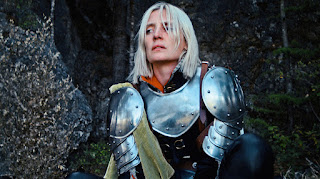At the beginning of Claude Schmitz's beguiling debut feature, which is currently screening at the International Film Festival Rotterdam, more than half of the film's original French title—Lucie perd son cheval—fades away, leaving the name "Perceval" on the screen. This neat touch is much more than a gimmick, though, as Schmitz's film strongly recalls Éric Rohmer's Perceval le Gallois, along with the work of a clutch of other French masters; beyond its debt to Rohmer's singular take on the Arthurian legend, some of Lucie Loses Her Horse's DNA can be traced to the likes of Robert Bresson's Lancelot du Lac and Bruno Dumont's Joan of Arc. But perhaps more than any of these fine influences, Lucie Loses Her Horse owes a great deal to the work of Jacques Rivette, a director who frequently incorporated the world of theatre into his films.
Like Dumont, Rivette took a tilt at the Joan of Arc story, and while his two-part epic Joan the Maid's influence can be seen in Schmitz's film, it is actually Rivette's more overtly theatre-centric works such as L'Amour fou and Va savoir that inform Lucie Loses Her Horse's exploration of the slippery relationship between theatre and cinema. Even the title of Schmitz's film is positively Rivettian, although if you waited around three hours to see Celine and Julie Go Boating's title characters finally jump in a vessel and take to the water, rest assured that Lucie (Lucie Debay, terrific) and her equine companion are parted in the early stages of Schmitz's sly, playful work. Upon losing her not so trusty steed, Lucie—kitted out in a fine suit of armour—promptly begins searching for the animal, in the process encountering two other female knights (Hélène Bressiant, Judith Williquet), both of whom have also managed to become separated from their horses. To lose one horse may be regarded as a misfortune, etc... actually, that quote doesn't quite fit this scenario—but hopefully you get the idea.
This medieval-themed episode comes wedged between two very different sequences: in the prior one, we witness Lucie the actress saying goodbye to her young daughter (Nao Wielemans-Debay) before she heads off to work; in the second, Lucie and the other two horseless knights—who, as it turns out, are fellow actresses—wake up in a theatre in which they're playing in a production of Shakespeare's King Lear. In case you don't count this as sufficiently meta, consider that Lucie's child is played by Lucie Debay's real-life daughter (Debay's partner is musician Antoine Wielemans, of Belgian indie act Girls in Hawaii), and also that Lucie Loses Her Horse morphed out of one of Schmitz's theatrical productions, Un Royaume, whose performances were truncated on account of the coronavirus pandemic. That one of the film's production companies is Le Théâtre de Liège, who staged the play on which the film is partly based, demonstrates how blurred the lines have become between the two works (and, by extension, the two media).
Before we get to thinking of where the MacGuffin that is Lucie's horse may have wandered off to, is it at all possible to establish which if any of these incarnations is the real Lucie? Is all the knights and horses stuff part of a fugue state, or simply another performance by the actresses? And does it really matter? Much of the film focuses on the increasingly chaotic backstage drama that unfolds at the theatre, most of which is fairly inconsequential yet oddly compelling. What we have here is essentially a shaggy dog story, one which remains completely absorbing should you allow yourself to go along with the joke. With Lucie Loses Her Horse, Claude Schmitz has planted one foot firmly in cinema and the other in theatre, resulting in both a deeply strange hybrid work and an alluring twilight world; it's a film as mischievous as it is haunting, and one strongly suspects that the late M. Rivette—Saturday past marked the sixth anniversary of his death—would have greatly enjoyed this unique meditation on theatre and cinema.
Darren Arnold
Images: IFFR





